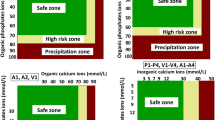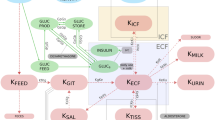Abstract
PHOSPHORUS-32 and calcium-45 appear in the blood of goats a few minutes after their administration through the teat1,2. The regulation of milk electrolyte content is little understood, and it seems necessary to examine the problem of udder permeability further in order to understand these problems better.
This is a preview of subscription content, access via your institution
Access options
Subscribe to this journal
Receive 51 print issues and online access
$199.00 per year
only $3.90 per issue
Buy this article
- Purchase on Springer Link
- Instant access to full article PDF
Prices may be subject to local taxes which are calculated during checkout
Similar content being viewed by others
References
Azimov, G. I., Proc. Second U.N. Intern. Conf. Peaceful Uses of Atomic Energy, Geneva, 27, 138 (1958).
Azimov, G. I., Fifteenth Intern. Dairy Congr., London, 1, 15 (1959).
Knutsson, P-G., and Sperber, I., Ann. Roy. Agric. Coll., Sweden, 27, 33 (1961).
Hydén, S., Ann. Roy. Agric. Coll., Sweden, 22, 139 (1955).
Author information
Authors and Affiliations
Rights and permissions
About this article
Cite this article
KNUTSSON, PG. Permeability of the Mammary Gland to Sodium-24, Potassium-42, Chlorine-36 and Iodine-131. Nature 192, 977–978 (1961). https://doi.org/10.1038/192977a0
Issue Date:
DOI: https://doi.org/10.1038/192977a0
Comments
By submitting a comment you agree to abide by our Terms and Community Guidelines. If you find something abusive or that does not comply with our terms or guidelines please flag it as inappropriate.



